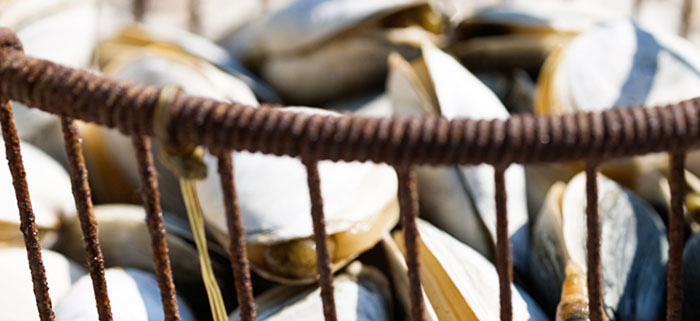First U.S. Clam Fishery Achieves Sustainability Certification
MSC Certificate Awarded based on Independent SCS Global Services’ Assessment
The Atlantic Surfclam and Ocean Quahog fishery has become the first clam fishery in the U.S. to achieve certification to the Marine Stewardship Council (MSC) Fisheries Standard. The MSC’s science-based standard is the world’s most credible and recognized standard for environmentally sustainable wild-caught seafood. The detailed sustainability assessment of the fishery was carried out by the independent, accredited certification body, SCS Global Services, and included extensive review by science experts, peer review, and stakeholder consultation.
Iconic surfclams and ocean quahogs are important commercial species in the U.S., found in products such as breaded clam strips, minced clams, stuffed clams, chowders and bisques. In 2014, the surfclams and quahogs harvest was valued at approximately $30 million and $22 million, respectively. These clams are now eligible to carry the internationally recognized blue MSC ecolabel, which provides consumers an easy way to choose seafood that can be traced back to a certified sustainable source.
Surfclam harvests are focused from off the Delmarva (Delaware, Maryland, Virginia) peninsula in the south, up to Georges Bank, Massachusetts in the north. Ocean quahog harvests are focused from eastern Long Island/southern New England up to Georges Bank, with most harvests occurring between 40 and 100 miles offshore.
Landing ports for U.S. Atlantic Surfclam and Ocean Quahog are New Bedford, Gloucester, and Fairhaven, Massachusetts; Warren and Bristol, Rhode Island; Point Pleasant, Atlantic City, Cape May, and Port Norris, New Jersey; and on occasion, Ocean City, Maryland. The processors supporting this assessment include: Bumble Bee Seafoods; Lamonica Fine Foods; Atlantic Capes Fisheries Inc.; and Surfside Foods LLC.

Mike Kraft, Vice President of Sustainability, Bumble Bee Seafoods, noted, "Our customers and consumers care about sustainability and want to contribute to healthy ocean ecosystems by enjoying sustainably harvested surfclams and quahogs now, and in the future, and we do too.”
Guy Simmons of Sea Watch Intl. Ltd commented, “We are proud to be a part of a client group that has worked diligently over the years with regulators to ensure the sustainability of this fishery. We’re pleased to have the MSC process confirm the sustainability of these healthy fisheries that are well-managed by the United States National Marine Fisheries Service.”
Brian Perkins, MSC regional director - Americas, said: "The MSC’s vision is for oceans to be teeming with life for future generations. We are extremely pleased to see the US Atlantic Surfclam and Ocean Quahog fishery succeed in the MSC process and we hope to be their partner in creating and maintaining new markets.”
The fishery is managed by National Oceanic and Atmospheric Administration's (NOAA) Mid-Atlantic Fishery Management Council under a single Fishery Management Plan since 1977.
Media Contacts:
Jon Corsiglia, Media Manager - US
Marine Stewardship Council
Email: [email protected]
Phone: 202-793-3286
Notes for editors
About the Marine Stewardship Council (MSC)
The Marine Stewardship Council (MSC) is an international non-profit organization. Our vision is for the world’s oceans to be teeming with life, and seafood supplies safeguarded for this and future generations. Our ecolabel and certification program recognizes and rewards sustainable fishing practices and is helping create a more sustainable seafood market.
The blue MSC label on a seafood product means that:
- It comes from a wild-catch fishery which has been independently certified to the MSC’s science-based standard for environmentally sustainable fishing.
- It’s fully traceable to a sustainable source.
More than 290 fisheries in over 35 countries are certified to the MSC’s Standard. These fisheries have a combined annual seafood production of almost nine million metric tons, representing close to 10 percent of annual global yields. Over 20,000 seafood products worldwide carry the blue MSC label. For more information, visit www.msc.org.
The MSC program could not exist without the many fishers around the world who work to safeguard stocks, ecosystems and their own livelihoods. Read stories about fishers working hard to safeguard our oceans.
